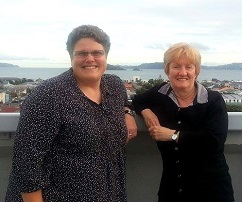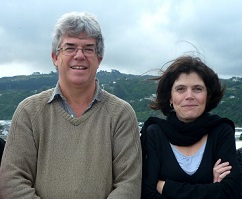Trade secrets
Nog, noggin and dwang might sound like terms of abuse to the uninitiated but are in fact lingo in the carpentry trade, two Victoria researchers have discovered.


At the end of 2013, Dr Jean Parkinson and Dr Averil Coxhead from the School of Linguistics and Applied Language Studies embarked on a project analysing language in trade professions. The three-year joint venture between Ako Aotearoa, Victoria University and Weltec focuses on how students learning trades acquire specialised language. The research team includes James MacKay, Len Matautia and Emma McLaughlin from Weltec, and Murielle Demecheleer from Victoria University.
“Very little linguistic research has been done on vocational teaching,” says Dr Parkinson, whose primary interest lies in the texts students read and write and the language patterns within them, while Dr Coxhead is focusing on their specialised vocabulary.
Dr Coxhead’s focus has been on isolating words used in the classroom and in textbooks that do not occur in the first 25,000 words of common speech, as well as identifying frequently occurring words in the first 25,000. Next, she will be working with Weltec tutors to confirm which of these words are technical terms and ranking their levels of technicality.
“There are a number of common abbreviations in the trades that students need to be familiar with. For instance, in carpentry it’s important to know that H1 refers to a clause in the Building Code and that H1.2 is a piece of wood,” says Dr Coxhead.
Many words from everyday vocabulary that have been adopted in the trades have unique meanings, says Dr Coxhead. This includes, for example, ‘fix’ and ‘fixings’, which tradespeople use to refer to ‘fixing’ or attaching something to a wall.
The research includes analysing builders' diaries, examining the specialised vocabulary of plumbing, carpentry, and automotive engineering, and visual images in texts, as well as interviews with students and tutors. Many classroom sessions have been recorded to see how language is used in teaching.
“I’ve been impressed by the interviews with tutors,” says Dr Parkinson. “Most of them are aware of the need to support literacy and are finding ways to achieve this. They are constantly pushing students to use the specialised vocabulary, rather than generic words.”
Students appear to be quickly picking up on the language that’s used in their area, says Dr Coxhead. “To me that shows they’re working in a really language-rich environment. If we can tap into the most effective ways of expanding vocabularies we might be able to help some of our first-year students at University, who encounter a lot of new terminology in their studies.”
The researchers have developed a method of testing students’ vocabulary before they start their course and again at the end to see how many new words they have learned.
“This testing is a vocational-specific way to test students’ trade-specific literacy levels, which could be used by Weltec on an ongoing basis,” says Dr Coxhead. “We are also looking at producing other resources that can be used in the classroom.”
The project is funded by Ako Aotearoa, Victoria University and Weltec.
